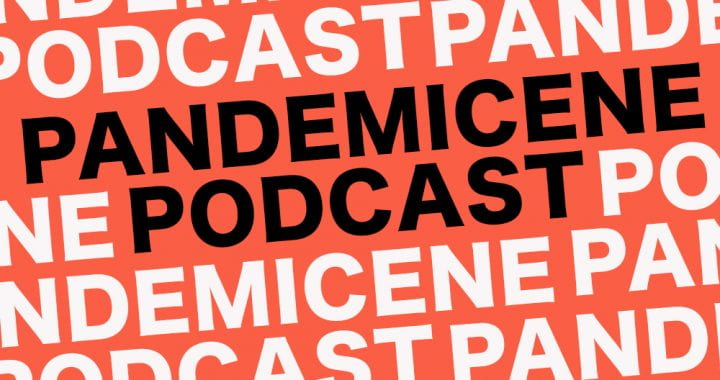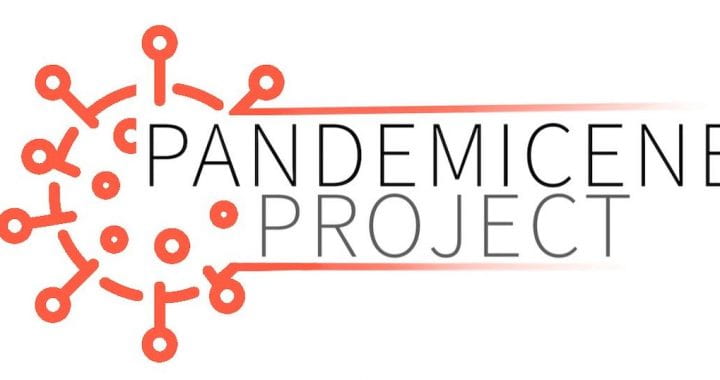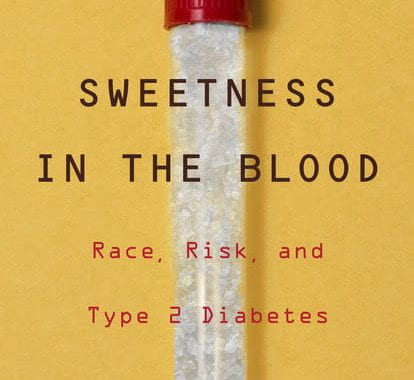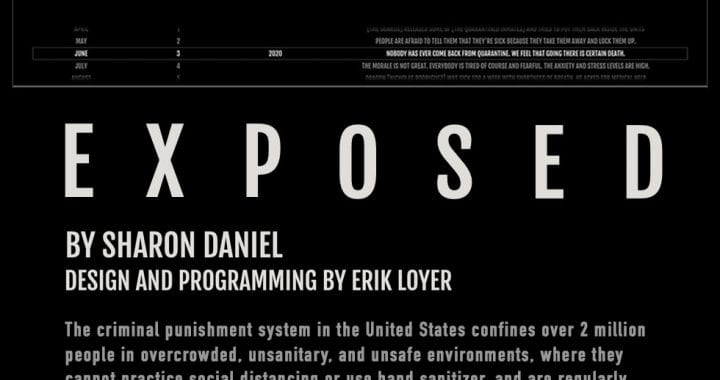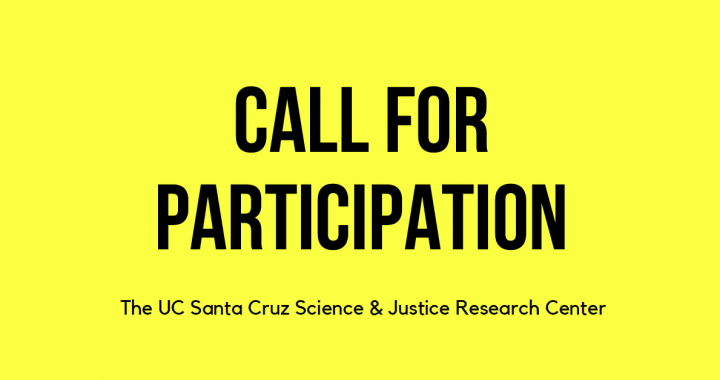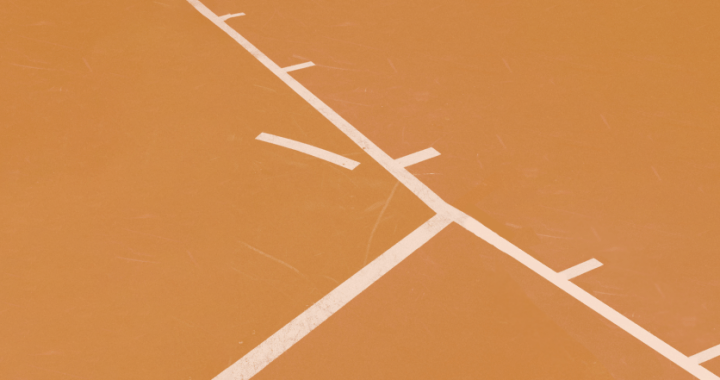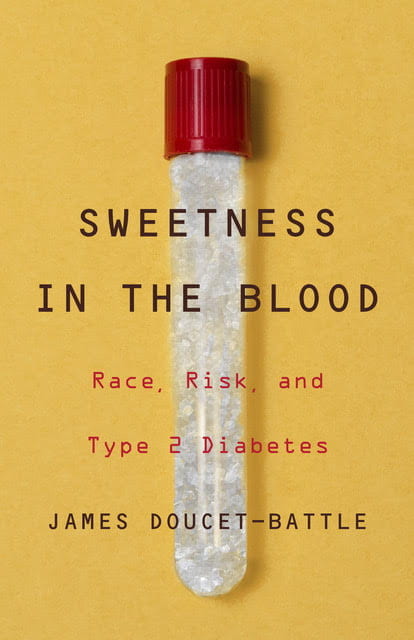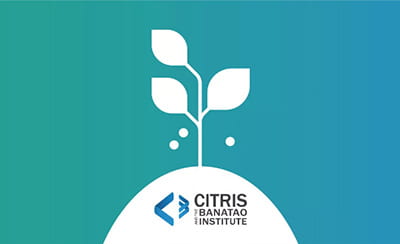The SJRC Pandemicene Project to reworld towards justice Season 2 of the podcast series begins airing January 27th!
News
The Pandemicene Project launches website for student podcasts and blogs
How do we create knowledge that orients us towards justice at this critical historical juncture, in the middle of a viral pandemic, and a pandemic of social inequality and racial discrimination that has sparked global unrest?
The SJRC Pandemicene Project to Re-world Towards Justice has launched a new website to host student podcasts and blogs! The Pandemicene Project can be found at: https://pandemicene.ucsc.edu/.
Re-worlding Towards Justice: Undergraduate students join SJRC researchers
Through engaging our communities the Science & Justice Research Center (SJRC) is producing knowledge that can help all of us – scholars and scientists, students and activists – imagine and enact just futures both in our home state of California and in our communities worldwide.
As the SJRC responded to the Covid-19 pandemic, we began Season 1 of our Pandemicene Project in March 2020 from the premise that creating trust-worthy knowledge that can foster a more just world requires attending to the deep inequalities and fissures in the polity that this pandemic has laid bare. The developing areas of concern were captured in the campus news article, “Discrimination, governance, and trust in the age of COVID-19”, featuring SJRC Founding Director Jenny Reardon. In Season 1, UCSC faculty, staff, graduate and undergraduate students worked together to interview members of the Science & Justice network about scholarly responses to this critical historical moment. A podcast series with 9 episodes produced by students aired on our local radio station (KZSC 88.1 FM) Sunday evenings, and the blog series on the SJRC website expanded. The Daily Beast Interview, featuring James Doucet-Battle, assistant professor of sociology and interim director of SJRC, highlighted the glaring race problems of COVID-19 vaccine trials, while the special issue of Transactions of the Institute of British Geographers featuring S&J Advisor and Politics Professor Matt Sparke’s article, “Contextualizing Coronavirus Geographically,” provided additional articles and perspectives on the pandemic. The first installment of the series, Dialogues on COVID-19 and Racism, by SJRC’s Theorizing Race after Race (TRAR) working group, “Black Geographies of Quarantine: A Dialogue with Brandi Summers, Camilla Hawthorne, and Theresa Hice Fromille” published on the UCHRI’s The Foundry.
Attending to what is going on locally (e.g., from the shelter-in-place locations of researchers), while drawing on the power and insights of our community elders and networks, over Winter and Spring 2021 the SJRC’s Pandemicene Project will launch Season 2. Season 2 will produce another round of podcast episodes and will expand to work in tandem with several new and established collaborative SJRC projects, as described below, that in their own way each help answer our overarching question of how to create knowledge that orients us towards justice in the middle of both a viral pandemic and a pandemic of social inequality and racial discrimination that has sparked global unrest. In Winter quarter, undergraduate student interns, representing the following 14 majors and minors, will join current SJRC researchers: Biochemistry, Cognitive Science, Critical Race and Ethnic Studies, Economics, Feminist Studies, Film and Digital Media, Legal Studies, Literature, Molecular, Cell, & Developmental Biology, Philosophy, Politics, Psychology, Sociology, and Statistics. Learn more about the students and independent researchers.
Our work over Season 2 will culminate in an ImaginACTivism workshop in Spring term. Stay tuned for a Call for Participation and Papers.
The following collaborative center projects will help feed Season 2:
The COVID-19 Pandemicene Project: Re-Worlding Toward Justice – Researchers will expand the zine, blog and podcast series by interviewing policy makers, practitioners, and mutual-aid and community organizers. Current student leads are looking to incorporate additional mediums (ie: animations, soundscapes, illustrations, etc.) and promotion methods (ie: social media, charts, graphics, photographs, maps, other new or historical oral and written materials). Students will help design and guide an ImaginACTivism workshop in Spring term. Learn more: The Pandemicene Project.
Incarcerated Care – In addition to joining a cohort of SJRC researchers in The Pandemicene Project, students will work directly with Film and Digital Media Professor Sharon Daniel’s team to expand the Unjustly Exposed interactive documentary website on COVID-19 in prisons and jails. Learn more: Season 1 Episode 4: Public Art and Carcerality.
Just Biomedicine: Orphan Drugs – In addition to joining a cohort of SJRC researchers in The Pandemicene Project, students will work with Dr. Andy Murray (UCSC Sociology alumni, SJTP graduate fellow and independent researcher) and UCSC faculty associated with the Center for Open Access Splicing Therapeutics (Jeremy Sanford, Michael Stone, Jenny Reardon, James Doucet-Battle, Matt Sparke). Students will research items related to pharmaceutical licensing agreements and bringing drugs to the market, and help the C.O.A.S.T. team understand the critical ethical and justice issues related to orphan-disease drug discovery and dissemination of splicing-based therapies. Learn more: Season 1 Student Blog.
Just Biomedicine: Third St. – In May, research from the SJRC Just Biomedicine Third St. research cluster will publish a chapter, “Just Biomedicine on Third Street? Health and Wealth Inequities in SF’s Biotech Hub” in a book (an atlas) titled, Counterpoints: A San Francisco Bay Area Atlas of Displacement and Resistance. Students will help SJRC celebrate and advertise its launch with contributors in Spring. Learn more: Season 1 Episode 6: Housing Justice and Big Tech.
Laboratory Life and Social Death: The Problem of Diversity in Science and Society – In addition to joining a cohort of SJRC researchers in the Pandemicene Project, students will work directly with Sociology Assistant Professor James Doucet-Battle on linkages between the social sciences, African Diaspora Studies, history, politics, and genomic science curriculum and training to conceptualize and develop an engaging and interactive online summer program in partnership with the Historically Black Colleges and Universities. Students will assist with research on and collecting materials related to the rigor, reproducibility and diversity of biomolecular data; identify other all-campus resources serving ABC students (ie: partner with AARC, HSI initiative, ODEI) and known challenges specific to summer sessions (refer to current BSU demands). Learn more: Bioethical Matriarchy (Doucet-Battle 2016), UC/HBCU initiative.
Theorizing Race After Race – In addition to joining a cohort of SJRC researchers in the Pandemicene Project, students will work directly with Sociology faculty James Doucet-Battle, Camilla Hawthorne, Jaimie Morse, and Jenny Reardon on a series of COVID-related racial health disparities research projects. Learn more: Black Geographies of Quarantine.
Uncovering the social factors lurking within diabetes risk
Assistant Professor of Sociology and Interim SJRC Director (fall 2020) James Doucet-Battle’s new book challenges assumptions about race within diabetes research and delves into the issue through the lens of African American experience.
Learn more in this campus news article, “Uncovering the social factors lurking within diabetes risk.”
UCSC arts professor documents spread of COVID-19 inside prisons, jails, and detention centers
The interactive web project by Film & Digital Media Professor Sharon Daniel creates cumulative public record and evolving history of the pandemic’s impact on those incarcerated. Exposed is the latest in a series of new media documentary projects created by Daniel that reveal social and economic injustice across public institutions, including the criminal justice system, the prison industrial complex, the public health system, and the public education system.
Learn more in this campus news article, “UCSC arts professor documents spread of COVID-19 inside prisons, jails, and detention centers.”
Call for Participation | Winter + Spring 2021
The Science & Justice Research Center (SJRC) invites up to 10 undergraduate students to join a cohort of researchers for both Winter and Spring 2021 terms. The Individual Study can range from 2-5 units and are part of a group. Independently, students can also work on senior thesis projects in areas related to Center themes (ie: forensic genomics, queer ecology, CRISPR, data privacy and biosurveillance, health care disparities and incarceration, the future of public goods, artificial intelligence and ethics, reproducibility and diversity in research).
SJRC student researchers help inform collaborative research, contribute to co-authored developing blogs, podcasts, and websites, opinion pieces, papers and proposals as well as help design Center programming. Students may track, collect, and organize articles from prominent theorists of race, inequality, and science and technology studies to continue our study of the social, political, and economic dimensions of the COVID-19 pandemic. More specifically, Winter and Spring opportunities include: working with a current cohort of students, staff and faculty affiliates to continue work in progress, conduct interviews and prepare transcriptions, edit interviews, create outreach materials sharing findings of research activities with the broader public (ie: writing blogposts, articles or reports, creating infographics, podcast episodes, animations, illustrations, interactive documentary websites, etc.). Students may also act as Critical Listeners (report on) select virtual related events (ie: Feb 2 IAS w/ SJRC colleague Ruha Benjamin).
Those interested in broadcast journalism, social documentation, digital and online student and public engagement are especially encouraged to apply.
Available Winter and Spring 2021
The COVID-19 Pandemicene Project: Re-Worlding Toward Justice – expand zine, blog and podcast to interview policy makers, practitioners, mutual-aid and community organizers. Current student leads are looking to add those interested in conducting interviews and those interested in getting the interview to the public via blogs, podcast episodes and additional mediums (ie: animations, soundscapes, illustrations, etc.) and promotion methods (ie: social media, charts, graphics, photographs, maps, other new or historical oral and written materials). Learn more: The Pandemicene Project.
Incarcerated Care – In addition to joining a cohort of SJRC researchers in the Pandemicene Project, up to 2 students will work directly with Film and Digital Media Professor Sharon Daniel’s team to expand an interactive documentary website on COVID-19 in prisons and jails. Learn more: Public Art and Carcerality, Unjustly Exposed.
Orphan Drugs – In addition to joining a cohort of SJRC researchers in the Pandemicene Project, up to 2 students will work with an independent researcher and faculty (James Doucet-Battle, Jenny Reardon, Jeremy Sanford, Matt Sparke, Michael Stone) on items related to pharmaceutical licensing agreements, bringing drugs to the market, ethical and equity issues related to orphan-disease drug discovery and dissemination. Learn more: student blog.
Laboratory Life and Social Death: The Problem of Diversity in Science and Society – In addition to joining a cohort of SJRC researchers in the Pandemicene Project, up to 2 students will work directly with Sociology Assistant Professor James Doucet-Battle on linkages between the social sciences, African Diaspora Studies, history, politics, and genomic science curriculum and training to conceptualize and develop an engaging and interactive online summer program in partnership with the Historically Black Colleges and Universities. Students may assist with research on and collecting materials related to the rigor, reproducibility and diversity of biomolecular data; identify other all-campus resources serving ABC students (ie: partner with AARC, HSI initiative, ODEI) and known challenges specific to summer sessions (refer to current BSU demands). Learn more: Bioethical Matriarchy (Doucet-Battle 2016), UC/HBCU initiative.
To Apply:
By Monday, December 7, students should email (scijust@ucsc.edu) with their resume/CV and expressing interest. We’re excited to learn about you, teach you what we’ve learned from each other, and incorporate your ideas! Please let us know the following:
- your name, major(s), any faculty advisors.
- any experiences with related items, why you are interested in being involved and how your curriculum, research, or career goals would benefit from the internship.
- propose any ideas or intended outcomes you would be interested in completing over Winter and Spring 2021, include your preferred methods and mediums.
Theorizing Race After Race: Black Geographies of Quarantine
The first installment of a series of dialogues on COVID-19 and Racism of the SJRC’s Theorizing Race After Race working group is now live on the UCHRI Foundry website! Check out Black Geographies of Quarantine: A Dialogue with Brandi Summers, Camilla Hawthorne, and Theresa Hice Fromille.
Contributors
Special thanks to Science & Justice researcher Aitanna Paker (recent graduate of Critical Race and Ethic Studies and Technology and Information Management) for helping with the interview.
Aitanna Parker is a recent graduate of UC Santa Cruz, with a BA in Critical Race and Ethnic Studies and a BS in Technology and Information Management. She plans to use her technical abilities for social good. Aitanna is currently working with the Science & Justice Research Center, looking at datasets to understand how Covid is negatively impacting racialized populations in the United States. She wants to continue this work in graduate school.
Theresa Hice Fromille is pursuing her PhD in Sociology at UC Santa Cruz, with designated emphases in Critical Race and Ethnic Studies and Feminist Studies. Her dissertation project draws insights from Black Geographies and youth studies to investigate how Black youth from the United States construct their racial identities during international travel.
Camilla Hawthorne is Assistant Professor of Sociology at UC Santa Cruz, a principal faculty member in the UCSC Critical Race and Ethnic Studies Program, and a faculty affiliate of the UCSC Science & Justice Research Center and Legal Studies Program. Camilla’s current project explores the ways that citizenship has emerged as a key terrain of struggle over racial nationalism in Italy, and argues that citizenship is crucial for understanding how racism and race are being reconfigured in the twenty-first century.
Brandi Summers is Assistant Professor of Geography and Global Metropolitan Studies at UC Berkeley and an alum of the UC Santa Cruz Sociology graduate program. Her research builds on epistemological and methodological insights from cultural and urban geography, urban sociology, African American studies, and media studies. Brandi’s first book, Black in Place: The Spatial Aesthetics of Race in a Post-Chocolate City, explores how aesthetics and race converge to locate or map blackness in Washington, D.C.
Forthcoming Book release! Sweetness in the Blood: Race, Risk, and Type 2 Diabetes (University of Minnesota Press, 2021)
About the Book
Decades of data cannot be ignored: African American adults are far more likely to develop Type 2 diabetes than white adults. But has science gone so far in racializing diabetes as to undermine the search for solutions? In a rousing indictment of the idea that notions of biological race should drive scientific inquiry, Sweetness in the Blood provides an ethnographic picture of biotechnology’s framings of Type 2 diabetes risk and race and, importantly, offers a critical examination of the assumptions behind the recruitment of African American and African-descent populations for Type 2 diabetes research.
James Doucet-Battle begins with a historical overview of how diabetes has been researched and framed racially over the past century, chronicling one company’s efforts to recruit African Americans to test their new diabetes risk-score algorithm with the aim of increasing the clinical and market value of the firm’s technology. He considers African American reticence about participation in biomedical research and examines race and health disparities in light of advances in genomic sequencing technology. Doucet-Battle concludes by emphasizing that genomic research into sub-Saharan ancestry in fact underlines the importance of analyzing gender before attempting to understand the notion of race. No disease reveals this more than Type 2 diabetes.
Sweetness in the Blood: Race, Risk, and Type 2 Diabetes (University of Minnesota Press, 2021) challenges the notion that the best approach to understanding, managing, and curing Type 2 diabetes is through the lens of race. It also transforms how we think about sugar, filling a neglected gap between the sugar- and molasses-sweetened past of the enslaved African laborer and the high-fructose corn syrup- and corporate-fed body of the contemporary consumer-laborer.
The book will be available in March 2021 at: https://www.upress.umn.edu/book-division/books/sweetness-in-the-blood
Learn more in this campus news article, Uncovering the social factors lurking within diabetes risk.
About the Author
James Doucet-Battle is an Assistant Professor in the Department of Sociology and Fall 2020 Interim Director of the Science & Justice Research Center at the University of California, Santa Cruz. He is a graduate of the University of California, Berkeley/University San Francisco Joint Medical Anthropology Program. His research and teaching interests lie at the intersection of science, technology and society studies, development studies and anthropological approaches to health and medicine. He applies these interests to study the political economy of genomic discourses about race, risk, and health disparities.
SJTP concludes comparative cross-campus review of graduate curriculum that make questions of gender and social justice fundamental to STEM training
With colleagues at the UC Davis Feminist Research Institute (FRI) and the UCSC Science & Justice Research Center concluded a seed fund grant awarded in 2019 from CITRIS and the Banatao Institute at the University of California under “2019-0112: Comparative Analysis of Interdisciplinary Training for STEM Scholars”.
More at: UC Santa Cruz researchers win four CITRIS seed funding awards
Summary
This project set out to compare two graduate training programs that center issues of gender, race, and social justice as fundamental to science training in STEM curriculums. Our comparison centered around the introductory seminars to the training programs taught during Winter 2020 by Dr. Kalindi Vora (UCD) and Dr. Jenny Reardon (UCSC).
FRI gathered data using field notes and a retrospective survey to analyze Seminar participants’ experiences. Notes, taken by the Graduate Student Researcher Maya Cruz, consisted of observations and analysis of seminar modules, discussions, and group activities. SJRC also gathered data through a retrospective participant survey, and Graduate Student Researcher Dennis Browe conducted an interview with SJRC’s Founding Director Jenny Reardon about the evolution of the Training Program and her experience teaching the introductory seminar. Due to IRB delays and campus disruptions, SJRC did not gather Seminar field notes. Both surveys asked participants to reflect on their learned capacity to recognize power and injustice in research environments; to intervene in research cultures and enact change-oriented research and practice; how their understandings of science and justice shifted throughout the course; and their experiences of diversity, equity, and inclusion initiatives in their fields. GSRs Browe and Cruz met over Summer 2020 to compare findings and share the results with the team for discussion.
While each Seminar was taught through the unique lens of FRI and SJRC, overall they offered the same types of tools, models, and skillsets for guiding STEM graduate students through thinking about issues of gender, race, and justice in their work and fields. They covered topics such as the politics of doing science; critically interrogating how knowledge gets produced and claims to objectivity and neutrality; and thinking about intersectionality, race, and the promises and pitfalls of anti-racist technoscience. Additionally, we found that enrolling graduate students from a wide range of disciplines is key to fostering generative conversation. FRI enrolled students from eight disciplines and SJRC enrolled students from six. Building trust within the Seminar communities was necessary to being able to think through the hard questions that often lay implicit within the students’ scientific fields. Both Seminars also found it pedagogically effective to invite relevant postdocs, visiting scholars, and faculty as module participants and discussion leaders. Both Seminars focused on experiential learning through hands-on projects. The culmination of both classes was a final project that effectively guided students to apply a feminist and justice-oriented lens to their fields. At SJRC, this took the form of a collaborative project, while at FRI, this took the form of instructional design.
Based on our findings, FRI and SJRC will continue to proactively recruit more science and engineering graduate students into their seminars. Further, both FRI and SJRC recognize the pedagogical importance of linking the course syllabus assignments to the events and projects happening concurrently at the Institute/Center during the academic year. Both will continue to build these connections within each respective Institute/Center, while also developing further collaborations between the campuses. Specifically, FRI and SJRC plan to host a cross-campus graduate student event over Zoom later this year, consisting of a roundtable discussion and manifesto writing workshop.
Website Launch! Unjustly Exposed – interactive documentary on COVID in prisons and jails
UCSC Film and Digital Media Professor and Science & Justice Affiliate Sharon Daniel launches Unjustly Exposed (https://www.unjustlyexposed.com/), an interactive documentary on COVID in prisons and jails.
About Exposed
The criminal punishment system in the United States confines over 2 million people, in overcrowded, unsanitary, and unsafe environments where they cannot practice social distancing or use hand sanitizer and are regularly subjected to medical malpractice and neglect. EXPOSED documents the spread of COVID-19, over time, inside these prisons, jails, and detention centers, from the perspective of prisoners, detainees, their families, and staff.
EXPOSED is comprised of quotes, audio clips, and statistics from online publications and broadcasts that are assembled to create a cumulative public record and evolving social history of the coronavirus pandemic’s impact on incarcerated people. Each quote is linked to its original source.
EXPOSED reveals the overwhelming scope and scale of suffering inside carceral spaces across the US as the virus continues to spread. The content is organized chronologically, along an interactive timeline, that on each day, provides abundant testimony to the trauma and precarity that prisoners experience under coronavirus quarantine. For example, on July 8th alone, there are over 100 statements included in the interface — statements made primarily by prisoners afflicted with the virus or enduring anxiety, distress, and severe hardships. Unfortunately, their words are all we have access to. Since the first reported coronavirus infection in the US, incarcerated people have been subjected to extreme forms of isolation — visits have been suspended, phone privileges restricted and the use of solitary confinement has expanded by orders of magnitude. The design of the interface, a monochrome image-less screen space that allows viewers to step through or select from thousands of ‘headline-style’ text sequences and audio clips, reflects the sense of confinement — the fragmentary and ephemeral forms of contact prisoners have with the outside — and signals that the injustice they collectively endure is structural.
Exposed Credits
By: Sharon Daniel
Design and Programming by: Erik Loyer
Research Assistant: Brian Myers
Research Interns: Alyssa Brouwer, Nailea Castillo, Brandon Castro, Anysia Deak, Srijeeta Islam, Jacinto Salz, Charlotte Schultz
The quotes, audio clips and statistics included in EXPOSED are excerpts from a wide array of online publications and broadcasts. All excerpts are linked in the interface to the original source.
Special thanks to Timothy James Young, Wayne La Mar Palmer and Ty Zimmerschied for their contributions.
Data Sources
UCLA Law COVID-19 Behind Bars Data Project
The COVID Prison Project
The Marshall Project State-by-State Look at Coronavirus in Prisons
Vera Institute of Justice
Developed with Stepworks
This project has been supported in part by the Arts Research Institute at the University of California, Santa Cruz

